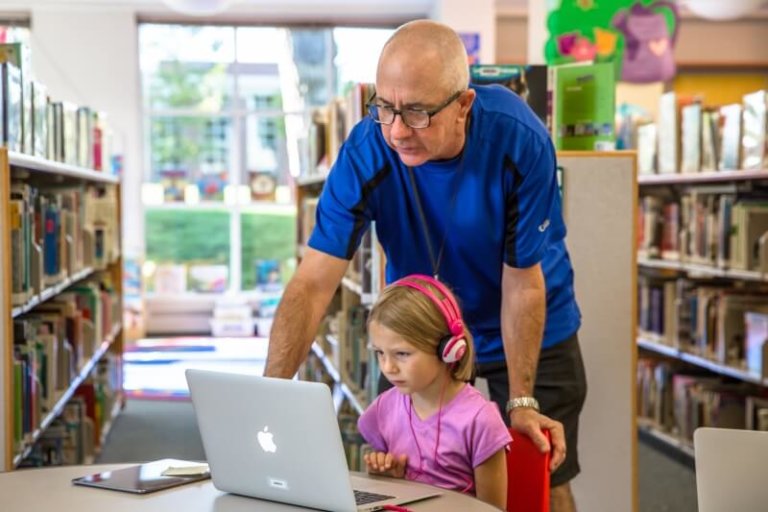One of my primary goals as Lower School principal is to support the faculty in their work with your children. I feel very fortunate to work with this talented group of educators. Every day as I walk through the hallways and visit classrooms, I am amazed by the creative and distinctive ways in which they make learning engaging and fun for your children. Whether it’s a hands-on science activity to create tie-dyed field trip t-shirts in first grade, a fourth grade math meeting on the rug in which students pair off and share their strategies for solving 24×20, or an art class in which Kindergarteners create self-portraits, Lower School teachers are passionate about the growth and development of young children. It’s the learning opportunities they create day in and day out that allow your children to make the academic, physical, social-emotional, and artistic gains that are the hallmark of their Lower School years at CA.
As we begin this new year together, parents think about why they chose enroll or re-enroll you child (or children) at Colorado Academy. Perhaps it was the feeling you first experienced when you walked on to our campus? Or maybe it was the quality of teachers and our program? You might have based your decision on the comprehensive “Pre-K to college” experience offered your child at CA—a developmental timeline that allows for a truly intentional 21st century education. Whatever your reasons, it was likely connected to CA’s mission statement that describes us as:
A dynamic liberal arts and sciences program that challenges students ethically, academically, artistically, and athletically . . . where teachers, students, parents, and staff foster trusting and respectful relationships . . . where students pursue excellence and seek to become life-long learners and contributors in our local and international communities.
We truly value creating a strong and resilient community of students, teachers, parents, and administration in Lower School. We work hard to communicate and inform parents about their children’s lives at school, directions we are taking with curriculum and assessment, and events that enhance our opportunities to get to know each other and grow together. I know I speak for every teacher in the room when I say we are here to listen to you and help you with your children’s journey through Lower School. Please don’t hesitate to be in touch with us. Communication is our most powerful tool.
The essence of our work is to create and nurture a learning community committed to educating your children in a manner that honors our mission statement. Here are a few highlights of what we’ll be working on this year:
Responsive Classroom to Build Community
To consistently build excellence for students, families, and the community, a school must have an intentional culture based on shared values, beliefs, and practices. In Lower School, we are continuing to focus on a healthy culture that builds character and honors social-emotional well- being. We are using the Responsive Classroom program school-wide to allow kids to engage with each other, build a strong sense of classroom community, and set the tone for social and academic success. We start each day with Responsive Classroom Morning Meetings and end as many days as possible with a closing meeting. We all use the same language and strategies as we set the tone for the new year and hold students accountable for expectations of kind and courageous behavior. We know we start with great children, but it takes consistent and intentional messaging every day to take many diverse individuals into a community where every child knows that he or she is known and valued by his peers and teachers, and where every child understands that his or her kindness, caring, and willingness to step up and be courageous as a friend and as a learner is what makes their school so special.
Growing Young Mathematicians
As we work to grow young mathematicians in the Lower School, we’re pleased the results were seeing with our signature Lower School math program. Using the research-based Investigations math curriculum as a framework, and supplementing with units from the Young Mathematicians at Works series, we encourage students to be problem solvers and creative thinkers at the same time they are developing computational fluency and learning foundational math concepts and skills. This year we have upgraded to the third edition of Investigations
For several years, we’ve been looking for a metric that would allow us to better measure how Lower Schoolers are developing as mathematicians. Last spring we piloted the MAP (Measure of Academic Progress) assessment with grades 2-5 and were encouraged to see that our kids are doing well. MAP is an online formative assessment, developed by the Northwest Evaluation Associate and used by many peer schools, that tells teachers in which math areas students have strong skills and where they need to continue to work. Based on that information, we have decided to implement MAP fully—three times a year/each trimester in grades 2-5—this year and will share your child’s beginning of the year data at fall conferences. In addition to telling us what students know, MAP also informs what they’re ready to learn next. Teachers can use these data to differentiate instruction and pinpoint individual student needs. You will learn more about MAP, our pilot results, and the new edition of Investigations in the November newsletter.
Support from Specialists
We are in the second year of supporting students and teachers with literacy and math specialist positions. Mary Singer continues in the math position and has been instrumental in moving us forward with our curriculum efforts and instructional support. Cheryl Amador and Maria Chavez are settling in and working to set up reading support for students and assist teachers with reading and writing strategies in the classrooms.
There’s more that I will share in forthcoming articles throughout the year. Thank you for entrusting us with your children’s education during these important early years.
